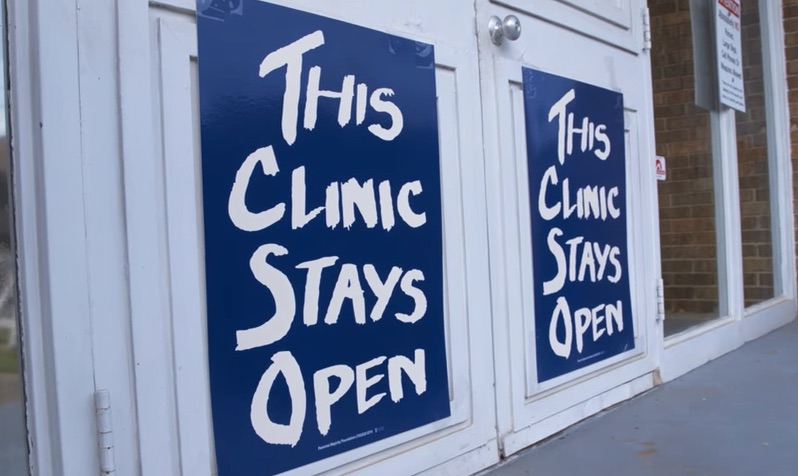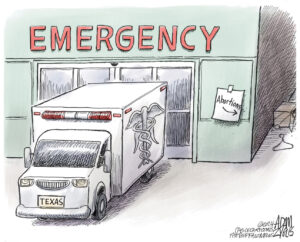Sentenced to Motherhood
Dawn Porter’s “Trapped”—which airs June 20 on PBS—explores the effects of restrictive abortion laws in Texas and other parts of the country. Video still from "Trapped" film trailer. (YouTube)
Video still from "Trapped" film trailer. (YouTube)
By Rose Aguilar
Video still from “Trapped” film trailer. (YouTube)
Last year, Marva Sadler, director of clinical services for Whole Woman’s Health in San Antonio, got a phone call about a 13-year-old rape victim who was 20 weeks pregnant. She needed an abortion as soon as possible. But though the girl had already made the four-hour journey from McAllen, Texas, to Whole Woman’s Health—the closest clinic that provides abortions—Sadler couldn’t help her.
“In order to see her, I need to put her to sleep. In order to do that, I need a nurse anesthetist,” says Sadler. “Because of this crazy law, it is impossible to find people to work for us.”
Sadler is referring to House Bill 2 (HB2), which in September 2013 drastically changed the way women and girls access abortion and reproductive health care in Texas. It is one of the toughest abortion-restriction laws in the country.
Its implementation, as Sadler’s anecdote illustrates, has created an unstable working environment in clinics across the state.
“I’m held hostage by [the nurse anesthetist’s] schedule,” says Sadler. “If she can’t be there, I can’t see patients. … Unfortunately, we have to turn this young girl away because I don’t have anybody to put her to sleep.”
The 13-year-old’s only other option would have been to travel to New Mexico and pay $5,000 for the procedure.
“What are the odds of her making that trip? It’s not likely,” says Sadler, tears streaming down her face. “In those cases, I feel like it’s an automatic sentence to parenthood. We sentenced her to motherhood.”
Sadler’s is one of many disturbing and heart-wrenching stories clinic workers, owners and doctors share in “Trapped,” a documentary by Dawn Porter that explores how Targeted Regulation of Abortion Provider (TRAP) laws such as HB2 are affecting clinics across the country. “Trapped” will air on PBS’s “Independent Lens” at 10 p.m. / 9 p.m. Central on June 20.
Since 2010, state legislatures have passed 288 TRAP laws that go far beyond what is necessary to ensure patients’ safety, according to the Guttmacher Institute, a policy organization founded in 1968 that advances sexual and reproductive health in the U.S. and globally.
Porter was in Jackson, Miss., making “Gideon’s Army,” her debut film about three public defenders working in the South, when she learned that the entire state has just one clinic that provides abortions. “I feel like I keep abreast of the news, [but] I had no idea about the rapid clinic closures across the South and Midwest,” she recalls.
She decided to visit clinics in Texas, Alabama and Mississippi, where she interviewed women who need reproductive health care services and the people who literally put their lives on the line to provide them. What she learned convinced her that the purpose of TRAP laws is not to regulate clinics, but to shut them down.
Texas’ HB2 is a case in point. It requires that physicians have admitting privileges at a hospital within 30 miles of the facility where they provide abortion care, even though having the procedure rarely results in hospitalization. When the law passed, Fund Texas Choice—a nonprofit formed in response to HB2 to help low-income and rural Texan women pay travel expenses when they need an abortion—predicted clinic closures because nearby hospitals do not have any incentive to allow an abortion provider to admit his or her patients.
HB2 also required Texas abortion clinics to upgrade to the standards of ambulatory surgical centers, a regulation that “does not serve the health of women in Texas, but instead jeopardizes women’s heath by restricting access to abortion providers,” according to the American Medical Association and the American College of Obstetricians and Gynecologists.
In “Trapped,” we see a December 2012 video of former Texas Gov. Rick Perry making his ultimate goal crystal clear at a press conference organized by Texas Right to Life. “My goal, and the goal of many of those joining me here today, is to make abortion, at any stage, a thing of the past,” he says. Six months later, Perry signed HB2.
After its passage, the number of licensed clinics where women could obtain a safe abortion from a doctor in Texas went from 44 to 18. In addition to abortions, the clinics that closed also provided contraception, breast exams, cancer screenings and other health services to mostly low-income and rural Texans.
The remaining clinics now have long waiting lists for a procedure for which time is of the essence.
By December 2015, the wait times at four clinics in Dallas and Fort Worth were as long as 28 days. Forcing women to wait so long risks pushing them from the first trimester of pregnancy to the second trimester, according to the Texas Policy Evaluation Project (TxPEP).
“The increase in second-trimester abortion is concerning from a public health perspective, since later abortions, although very safe, are associated with a higher risk of complications compared to early abortions,” says Dr. Daniel Grossman, a TxPEP investigator and professor in the department of obstetrics, gynecology and reproductive sciences at the University of California, San Francisco. “Later abortion procedures are also significantly more costly.”
Clinic closures are forcing women to travel hundreds of miles and spend extra money on bus and plane tickets, lodging and child care, according to Fund Texas Choice. More than 40 percent of women who have abortions are poor and 61 percent already have at least one child, according to the Guttmacher Institute.
In “Trapped,” Sadler tells the story of a family that traveled to an Austin clinic from rural Texas. “The only way they could afford to get here was to gas up their RV and bring their family,” she says. “They slept in our parking lot for two days in that RV with two small children.”
HB2 was “enough to crumble the [women’s reproductive health] service industry completely,” says Amy Hagstrom Miller, founder and CEO of Whole Woman’s Health, a group of eight reproductive health clinics in Texas, Maryland, Illinois, Minnesota and New Mexico.Hagstrom Miller is the lead plaintiff in a legal challenge to HB2 that was heard by the Supreme Court in March. A decision in one of the most important abortion cases since Roe v. Wade is expected in June. If the court upholds HB2, clinics in Texas will continue to close, and states across the country will be free to enact similar laws.
At issue is whether the onerous requirements constitute an undue burden on a woman’s right to access abortion. Although less than 1 percent of Whole Woman’s Health patients experience a complication that requires hospitalization, abortions in Texas must be performed in clinics akin to ambulatory surgical centers.
In “Trapped,” Sadler gives a tour of one center, which looks like an operating room. The walls are covered with medical dispensers and machines. “We can’t have any freestanding oxygen machines. The suction has to be in the wall,” says Sadler. “I don’t know that we’ve ever used any of these things on the wall in this clinic, ever.”
Then there’s the pharmacy, which is required to be stocked with drugs the clinic doesn’t normally use. “The drugs always expire because we never use them,” she adds. “Every month, we spend $1,100 throwing out expired drugs and replacing them.”
In other states, TRAP laws require doctors to provide women and girls with misleading information about abortion. In “Trapped,” Dr. Willie Parker, who provides care in Mississippi’s one and only abortion clinic, gives his patient a packet containing an “informed consent resources list.”
“I’m required by law to tell you that by having an abortion, it can increase your risk for breast cancer,” Parker says, adding that “there is no scientific evidence to support that.”
“The state requires me to tell you that you can have heavy bleeding that can be life threatening,” he continues. “It can require you to be transferred to the hospital and need a blood transfusion. If you have bleeding that can only be controlled with the removal of your uterus, you’d have to have a hysterectomy and lose your ability to have babies in the future. But guess what? Those are the exact same risks associated with having a baby. You’re not taking any extra health risks. Abortion is extremely safe.”
In “Trapped,” we also meet clinics owners in Alabama who are struggling to stay open and provide care to patients from throughout the South, including Mississippi, Louisiana and Florida.
Parker says that Alabama has taken a page from the playbook of Mississippi and other states that are chopping away at reproductive rights. “These rules, we know, don’t do anything to the safety of women. They’re letting politics trump medicine,” he says.
“To hear the phones ringing and not [be] able to help these women is very disheartening,” says Gloria Gray, owner of the West Alabama Women’s Center in Tuscaloosa. Gray opened the clinic in 1993 to provide quality care to women who were being treated by unregulated doctors. Approximately 80 percent of her patients are at or below the poverty line.
She believes that closing clinics is not going to stop abortions. “Women are going to have abortions; it’s just that they are not going to be safe and legal,” she says.
In “Trapped,” a 43-year-old mother who had been on birth control was shocked to learn she was pregnant. Every Alabama clinic she called was closed, so she went online to search for home methods. She ordered herbs, but was afraid to take them.
In a recent New York Times op-ed, economist Seth Stephens-Davidowitz writes that in some parts of the country, “demand for self-induced abortion has risen to a disturbing level.” His conclusion is based on higher-than-usual Google searches for the phrases “how to have a miscarriage,” and “how to self-abort.” He found that the majority of the 700,000 searches he studied were conducted in states considered by the Guttmacher Institute to be hostile to abortion.
In Texas, between 100,000 and 240,000 women aged 18 to 49 have tried to end a pregnancy without medical assistance, according to estimates by the Texas Policy Evaluation Project. “Trapped” documents women there who are buying drugs on the black market to self-induce.
This is all happening at a time when support for Roe v. Wade remains incredibly high. Despite what we constantly hear in the media, abortion is not the most divisive issue in the United States. Seven in 10 Americans believe that the landmark Supreme Court ruling should stand, according to a 2013 Wall Street Journal/NBC News poll. When extreme anti-choice propositions are put before voters, they almost always lose, even in the most conservative parts of the country. It’s extremist politicians, mostly Republicans, who are passing these destructive and dangerous TRAP laws.
Marva Sadler didn’t keep in touch with the young rape victim in Texas, but it’s safe to assume that the 13-year-old is now a mother. The Supreme Court’s decision in June will determine whether American women and girls will be forced to have children they didn’t plan for—or put their lives at risk by self-aborting—or have access to a safe and legal abortion without the interference of politicians who claim to champion small government. Their lives hang in the balance.
Rose Aguilar is the host of “Your Call,” a public affairs radio show that airs from 10 a.m. to 11 a.m. daily on KALW 91.7 FM in San Francisco. She has written for The Guardian, Al Jazeera English and The Economic Hardship Reporting Project, and is a member of the Native American Journalists Association. She is the founder of the Use Your Voice workshops, which empower women in their professional and personal lives. She is also author of “Red Highways: A Journey into the Heartland,” and is currently working on a book about older female activists.
Your support matters…Independent journalism is under threat and overshadowed by heavily funded mainstream media.
You can help level the playing field. Become a member.
Your tax-deductible contribution keeps us digging beneath the headlines to give you thought-provoking, investigative reporting and analysis that unearths what's really happening- without compromise.
Give today to support our courageous, independent journalists.





